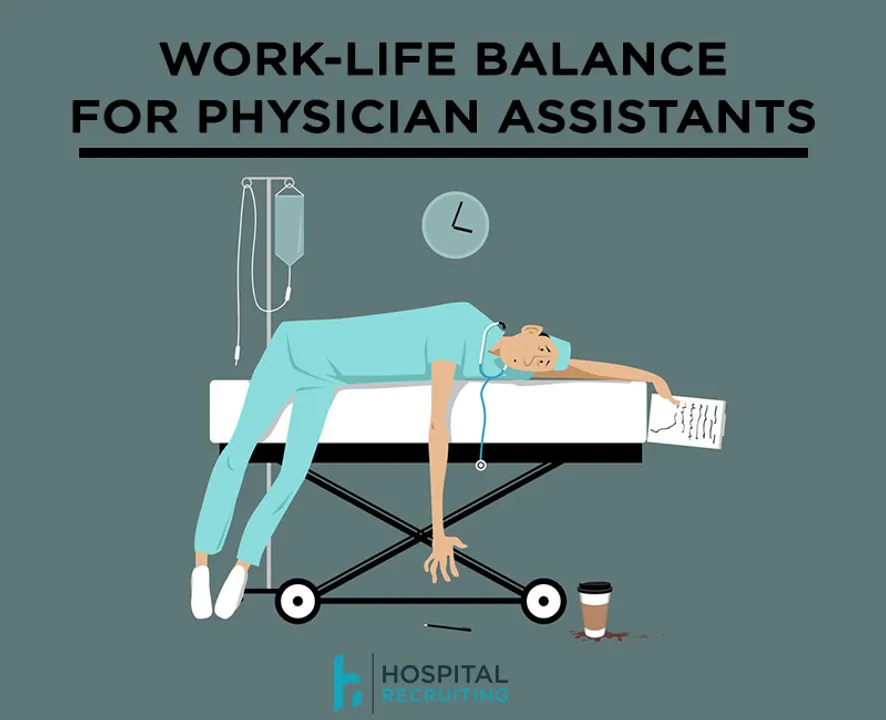Work-Life Balance as a Physician Assistant: Is it Possible?

We have all been there. It is nine o’clock at night and you are sitting at your computer, sipping coffee and eating takeout that was hurriedly picked up on the way home from the clinic as you grabbed your kid from soccer practice, and STILL writing notes on patients from the day. Or returning calls. Or refilling medications.
Sometimes it can feel like this profession, that you worked so hard to be a part of, is oozing into so many other areas of your life that the days run together. Pile on continuing education and family obligations, and it is simply overwhelming. Oh, and don’t forget about the pandemic.
So, is there a way to balance being a PA and a functioning adult? The answer is a resounding “YES!”
While everyone has their own way of maintaining balance in their lives, there are a few methods that are time-tested ways to help with work-life balance.
Schedule, Schedule, Schedule

The benefits of scheduling cannot be overstated. One of the reasons that it is so effective for health care providers specifically is because it gives us a reason to STOP what we are doing. Are you only scheduled to do charting until 7PM? Great, that is a good reason to finish up and go enjoy time with your family and eat dinner together. Have you been looking forward to catching up on This is Us? Well, now you can after 7PM.
It is very common for providers to lose track of time when wrapped up in patient care, and we forget to take care of ourselves. While scheduling does not eliminate all the work in front of us, it does provide a good reason to step back and take a break from work to focus on our own lives.
There is an abundance of scheduling resources available for free. One of the most often overlooked tools is the Calendar app on any major mobile platform. With this, you can schedule virtually anything in manageable chunks throughout the day with a simple tap. These features often “talk” to other features on phones, such as voice command and through messaging integration. It is also very easily accessible on a mobile device and can send friendly reminders and notifications for schedule alerts.
Set Limitations and Expectations

Arguably just as important to work-life balance, if not more important, is the ability to set limitations and expectations. For whatever reason, human nature seems to compel us to want to please everyone, do everything, and be everywhere. It is exceedingly easy to agree to see that extra patient or volunteer to help with a new committee. It is more difficult, however, to “just say no.” No one can do everything, and you are no exception. Don’t fret; that is a GOOD thing.
While “just saying no” does not always apply, it is remarkable how much time can be saved by eliminating just a few extra obligations. An extra hour here or there will allow time to schedule (see what we did there?) that time for charting or other necessary work.
Most people who find it difficult to say no invariably have seen the ripple effects that sometimes spiral from this. Before we know it, we are being scheduled to volunteer for meetings that we never agreed to or to see patients that we did not know about. We become the “go-to” person for those extra tasks. While difficult, it is important to break this cycle if you are finding that there is too much to accomplish to maintain balance in your life. Work and patients are absolutely important, but so are personal health and relationships with our family and friends.
Maintain Focus and Avoid Distractions

While maintaining focus at work may sound obvious, it is surprising how little focus we sometimes have at the times when it is most needed. With proper focus, charting and essential work can happen much more quickly and efficiently.
Eliminating distractions is an integral part of maintaining focus. It is easy to be interrupted by simple distractions over the course of the day that slowly eat into the time where other work tasks should be completed. Here is an example scenario:
Physician Assistant Workday
8:00 – a phone call from a patient regarding a medication refill (20 minutes)
9:00-5:00 – 7 discussions with nursing staff regarding non-critical information (40 minutes)
12:15 – the secretary comes in to discuss what she did last weekend (20 minutes)
2:00 – another transferred call from a patient about medication (10 minutes)
4:00 – clean out the breakroom refrigerator due to a “funny” smell (15 minutes)
5:00 – the other PA comes in to discuss what he is making for dinner (15 minutes)
As can be seen, these distractions total about 2 hours out of the workday that could otherwise be spent accomplishing essential work. This is not including the time it takes to reorient to the task that was being completed before the distraction.
While some distractions cannot be avoided, it is possible and beneficial to group similar tasks together to complete them more efficiently. Utilizing communication software can also make workplace communication more streamlined and efficient. Some examples of these include Skype and Slack, though this will vary by individual workplace. It should be noted that it is always important to never compromise patient care in working toward better work efficiency.
Be Willing to Make a Change

Another method to work towards work-life balance may not be available for everyone, but it is worth discussion. As a PA, you may find that burnout is becoming a real concern. If, despite your best attempts, work-life balance seems unreachable, making a change may be the next best step.
Change at work may take many forms, though some of the most common include the following:
- Transitioning to part-time employment
- Requesting a sabbatical
- Changing workplace or specialty
- Taking some time off
- Go on a vacation!
While scheduling a vacation or taking some time off may be the solution that you need, sometimes it is only a temporary fix for a permanent problem. As healthcare providers, the mentality sometimes can be “suck it up, it could be worse.” While this has likely helped many a PA student or medical resident, it is usually not sustainable for a balanced and joyful life. Sometimes finding a new job, changing specialties, or leaving your job outright are exactly what is needed for an improvement in one’s quality of life.
To wrap it up
Physician assistants, and other healthcare providers for that matter, got into the field of medicine to help improve the lives of the patients with whom they work. Due to this, it can be hard to maintain a balance between work and life. It can be so easy to take on that extra patient, or stay up late finishing charts, or even neglect one’s own health for the sake of the patient. Provider health is integral to patient health, so it is important that Physician Assistants find strategies to maintain good balance in their lives. This may be as simple as implementing scheduling changes, or as complex as changing jobs. Whatever you decide, remember that maintenance of work-life balance is important if we want to serve the patients that we care so much about.
Related Posts
